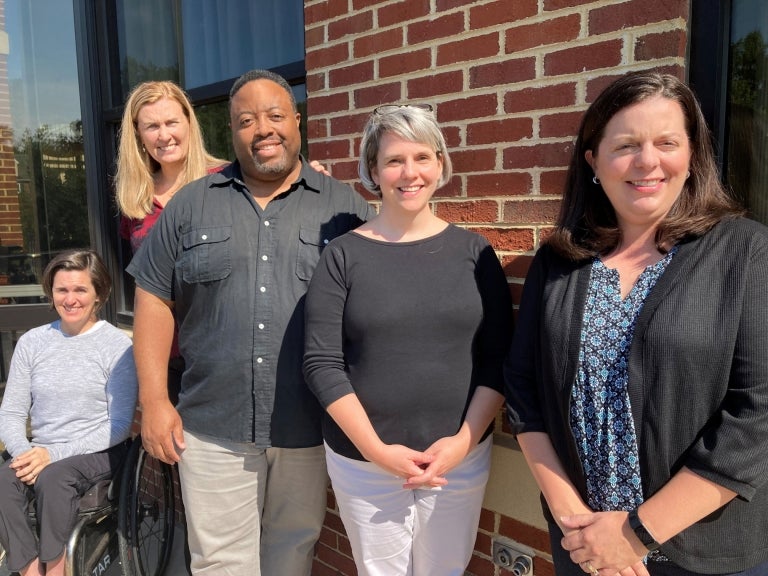
Members of the TiDe team at their retreat in August. Pictured left to right: Kerri Morgan, Marcie Harris-Hayes, Greg Hicks, Beth Skidmore, Laura Waterstram. Not pictured: Simone Gill, Sue Giancola, Natalie Leland
“What’s the game-changing need right now in rehabilitation research?” poses Beth Skidmore, associate dean for Research and professor of Occupational Therapy in the School of Health and Rehabilitation Sciences (SHRS). The answer to her and many others in the field is clear: to fill the deep void of investigators with diverse backgrounds in rehabilitation research. The need is also clear to the National Institutes of Health (NIH), who announced in late August the funding of Skidmore’s groundbreaking, national-level training program called TiDe, Training in Diversity education for rehabilitation research, for the next five years.
According to Skidmore, she and SHRS alumnus Gregory Hicks (PhD ‘02) from the University of Delaware, have been turning over ideas for the past several years on how to increase the diversity of perspectives in rehabilitation science. “Diversity among our scientists influences the diversity of our research questions and the overall impact of our research.” Rehabilitation research can’t afford to wait for its workforce to diversify organically. The industry must take initiative to recruit and train scientists who reflect the needs and perspectives of the nation’s population more accurately.
“TiDe is the first research education program devoted to creating a sustainable community of diverse clinician scientists with the capacity to advance rehabilitation research,” says Skidmore.

An Idea Built on Successful Training Models
The TiDe program was funded through a R25 grant from the Eunice Kennedy Shriver National Institute on Child Health and Human Development’s National Center for Medical Rehabilitation Research. “The research education grant mechanism is used to train faculty in research skills,” Skidmore explains.
As she and Hicks moved forward with the development of TiDe, they looked at similar programs as models. They are both graduates of the NIH-funded Comprehensive Opportunities for Rehabilitation Research Training (CORRT) K12 career development program that, for the past 15 years, has been a path to outstanding mentoring and training for the next generation of rehabilitation scientists. She says that this program, and those like it, “have been instrumental in changing the way we train rehabilitation scientists. They’ve provided a launching pad for several nationally renowned rehabilitation scientists and have forever changed in the success and recognition of rehabilitation research at NIH.”
“Our hope is that TiDe becomes another one of those cultural icons in the rehabilitation research training space.”

Following the TiDe Path
Over a two-year commitment, clinician scientists will learn how to create an optimal learning environment that will embrace students from groups underrepresented in biomedical science and help them succeed in rehabilitation research careers. The program will create communities to combat the sense of isolation, develop pathways through mentoring and financial support for career development and research, and reduce barriers to achievement by exposing the “hidden curriculum” that is the key to success in research. Clinician scientists and their students will learn how to support paths to becoming independent clinician scientists, and then further enrich and expand the network as they in turn help the next generation of students. In addition to mentorship, there will be a focused educational curriculum delivered through an annual workshop at the University of Delaware, quarterly online webinars and monthly meetings with mentors, peers, and consultants.
The training will be developed by three groups: an advisory group of nationally-representative scientists and students who are already engaged in rehabilitation science and who identify as a member of one or more underrepresented groups in biomedical science; an executive committee with rehabilitation scientists from partner universities who are invested in a training program that’s going to tackle this important problem and have volunteered devote time to shaping the curriculum; and clinician scientist mentors and students who will provide feedback on the program as they reflect on what they learned and valued.
The executive committee includes Susan Giancola, University of Delaware; Simone Gill, Boston University; Marcie Harris-Hayes and Kerri Morgan, Washington University in St. Louis; and Natalie Leland, University of Pittsburgh, as well as several additional faculty nationwide with a broad range of rehabilitation research expertise. Laura Waterstram, also with Pitt's Department of Occupational Therapy, works as TiDe’s Program Administrator. Collectively, the leadership team represents three of the top five Occupational Therapy and the top three Physical Therapy programs in the country, as ranked by U.S. News & World Report.

Beth Skidmore, TiDe Program Co-Director
An Eye on the Future
TiDe has been working with the SHRS Marketing, Communications, Recruitment and Enrollment (MCRE) team to develop a marketing and communications plan. This fall they will begin to contact occupational and physical therapy student candidates from underrepresented groups through social media, multimedia content, professional networks and conferences. Specifically identifying these demographics in the messaging will help the candidates learn about the program more readily. In spring 2023, TiDe leaders will begin recruiting five mentors who will be paired with five graduate students over the next two years. A new group of mentors and mentees will be selected each year thereafter for another three years.
Like the programs that have preceded TiDe, Skidmore postulates that TiDe will forever change rehabilitation research “so that hopefully in another 15 to 20 years, the rehabilitation research community will be comprised of a diversity of scientists reflecting the diversity of perspectives of those who receive rehabilitation services throughout the nation.”
Starting a new national program is not a small undertaking, but Skidmore is more than ready. “It’s going to be a lot of work. Everyone asks, ‘Are you overwhelmed?’ And I’m not. There is a lot of work to do and it’s going to be hard work, but it’s work that we are eager to do.”
---
Published September 22, 2022
